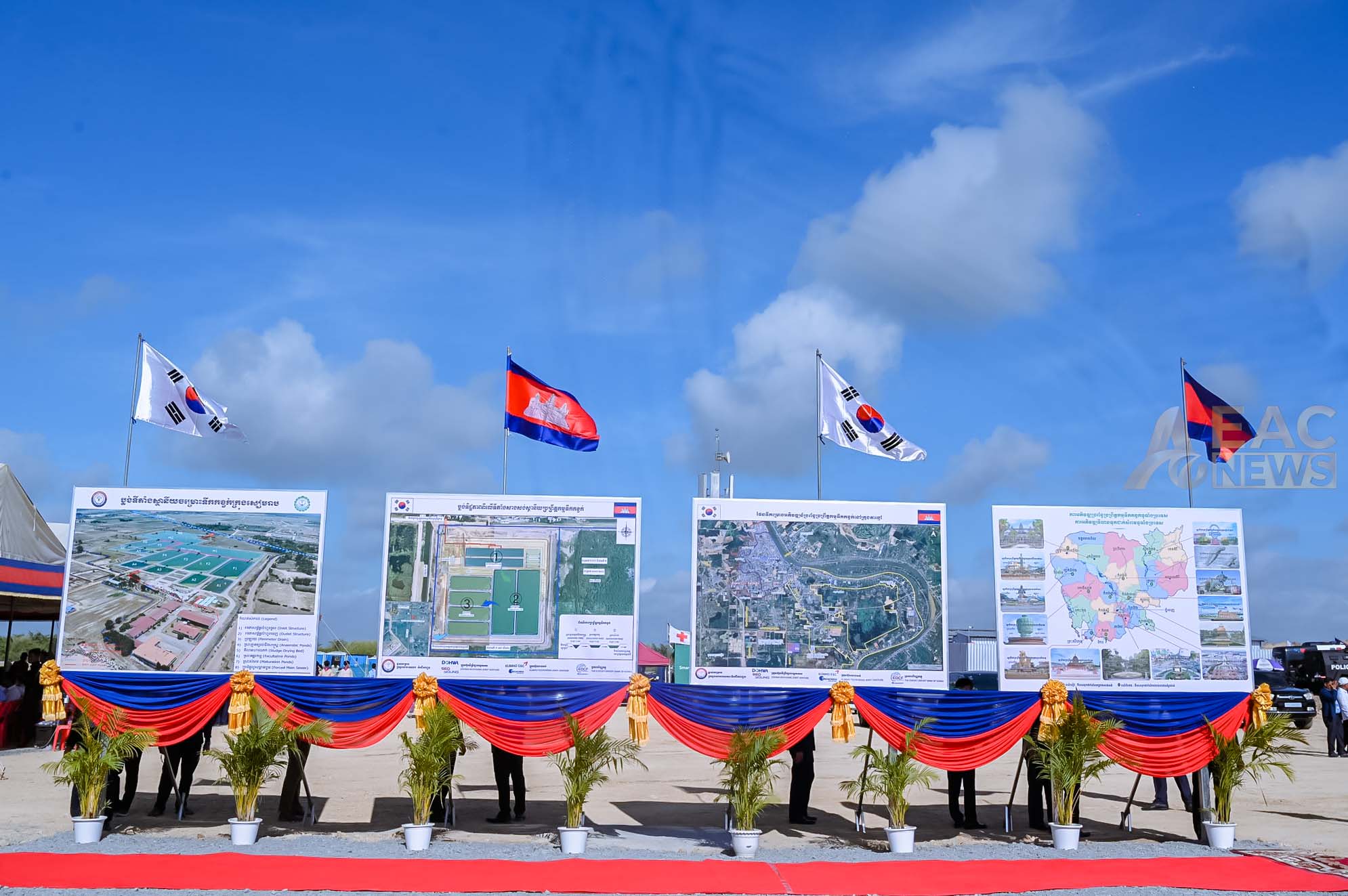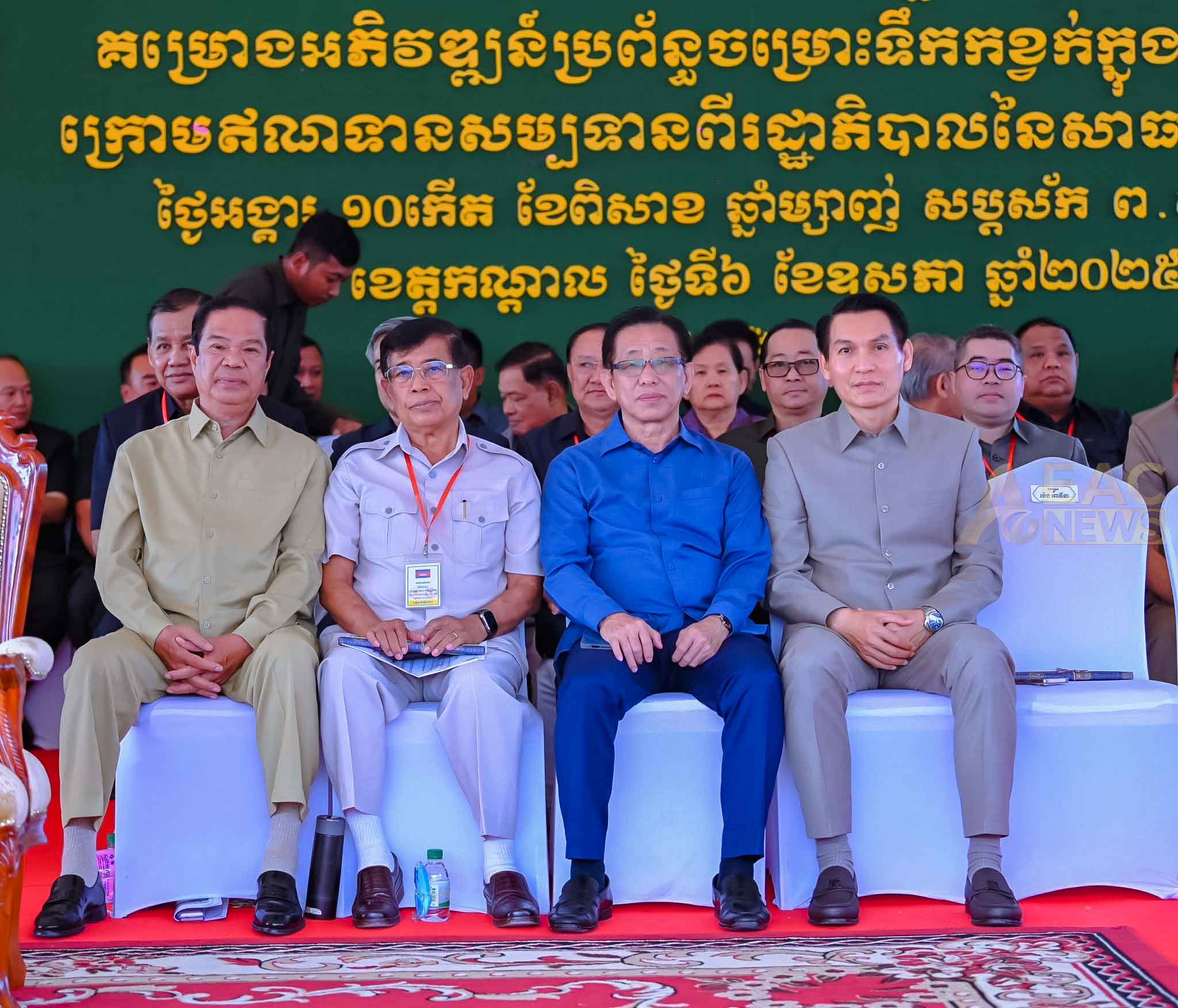Inauguration of Nearly $100 Million Wastewater Treatment System Development Project in Takhmao City
Takhmao City, Kandal Province — The groundbreaking ceremony for the construction of a comprehensive wastewater treatment system in Takhmao City was presided over by Prime Minister Hun Manet on Tuesday morning, May 6, 2025. The project, valued at nearly $100 million, is financed through a concessional loan from the Government of the Republic of Korea.
Prime Minister Hun Manet has issued a strong directive to leaders nationwide, especially those in provincial capitals bordering rivers and the sea, emphasizing the importance of monitoring and regulating industrial wastewater discharges. During a recent address, he underscored the critical need to ensure factories properly treat wastewater before releasing it into public water sources to safeguard public health and environmental integrity.
The Prime Minister stressed that improper wastewater disposal poses serious risks to citizens’ health and industrial activities. He recalled incidents in the past, such as a factory in Battambang province that discharged untreated wastewater, adversely affecting local residents.
He emphasized, “This work must receive urgent attention, particularly in provincial capitals and areas near water bodies. We must ensure that factories and enterprises discharge wastewater only after proper treatment.” The Prime Minister highlighted that some factories produce high-chemical-content products, which necessitate stricter environmental oversight.
Prime Minister Hun Manet directed the Department of Environment and provincial authorities to conduct regular inspections and impose strict penalties on violations. He emphasized that any factory releasing contaminated water should be suspended until they resolve the issues, warning that failure to comply could threaten public health. 
"Healthy citizens are a nation's greatest asset. Poor health burdens society and hampers development. Therefore, the Royal Government strives to improve public health through infrastructure development and environmental management," he said.
The Prime Minister reaffirmed that the government views health not only as treatment but also as the result of a clean environment. Recognizing the importance of wastewater management, the government is committed to expanding treatment systems to reduce disease, mortality, and environmental pollution.
He elaborated, “For each citizen, health is the highest priority. If we are healthy, we contribute to national development. If not, we become a burden on our families and society. Many citizens form the backbone of our nation’s strength.”
He further reflected on the government's achievements over the past 20 years, including the expansion of healthcare infrastructure such as hospitals and specialized centers, which have significantly improved medical services across Cambodia.
Prime Minister Hun Manet called on the Ministry of Public Works and Transport, in collaboration with relevant ministries, local authorities, and development partners, to develop a master plan for wastewater and stormwater infrastructure across urban and rural areas, ensuring sustainable growth aligned with national development goals.
He also announced the ongoing development of the wastewater treatment project in Takhmao City, designed to separate rainwater and wastewater, involving a treatment plant with a capacity to process 12,000 cubic meters daily, along with seven pumping stations and a comprehensive network covering six communes in Takhmao. Additionally, a flood relief system featuring drainage networks and stormwater pumps is part of this initiative.
He praised the longstanding relationship between Cambodia and South Korea, which, over 28 years, has become a strategic partnership fostering investment, trade, and cultural exchanges. 
He expressed gratitude toward the South Korean government and people for their support of Cambodia’s development plans and ongoing cooperation in key sectors, contributing significantly to the country’s infrastructure and economic growth.
Minister of Public Works and Transport, Peng Purna, highlighted the significance of the project, stating, “This development reflects the Royal Government’s commitment to improving wastewater management infrastructure in response to rapid urban growth and population increase within major cities of Cambodia.”
The project encompasses two primary components: the construction of a separate sewage and rainwater drainage system, and flood mitigation measures. 
The wastewater treatment facility will utilize a natural pond method on a 30-hectare site, capable of processing 12,000 cubic meters of wastewater daily. The project includes the construction of seven wastewater pumping stations and approximately 125 kilometers of wastewater collection networks, connecting six service areas: Kampong Sanhanh, Deum Mien, Taktol, Takhmao, Prek Hor, and Prek Russey Sangkat, covering about 974 hectares within Takhmao City.
Flood mitigation efforts involve building a rainwater drainage network, including box culverts and circular culverts along National Road No. 21 from Takhmao roundabout, spanning five kilometers. The project also includes the construction and rehabilitation of two rainwater pumping stations and additional drainage networks within Takhmao.
Minister Peng Purna emphasized the project's capacity-building component, noting that a one-year operation and maintenance training program will be conducted to enhance the skills of local officials and staff responsible for system management.
The project is executed by a joint venture between KUMHO-TECHCROSS and supervised technically by DOHWA-SEOYOUNG, with a total contract value exceeding US$90 million. Construction is scheduled to be completed within 36 months, targeting 2027.

























